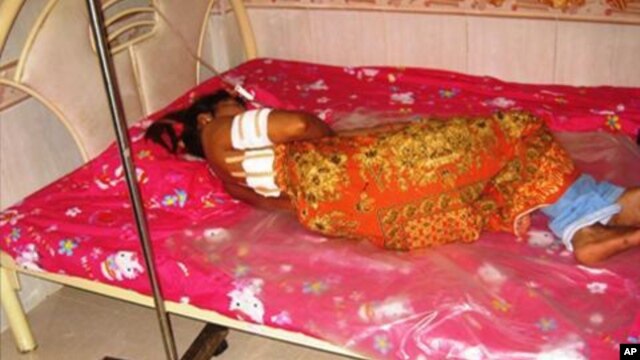 |
| An unidentified garment worker lying on a hospital bed with multiple gunshot wounds to her back. Police identified the mayor of Bavet town Chhouk Bandit as the prime suspect. [VOA] |
“Prosecuting innocent people for serious crimes perpetrated by people under government protection is now standard operating procedure for ensuring impunity in Hun Sen’s Cambodia,”
Establish Independent Commission for Justice in Shooting of Female Workers
DECEMBER 22, 2012
(New York) –The Cambodian government should appoint an
independent commission to investigate allegations that a ruling party municipal
governor shot and wounded three women workers, Human Rights Watch said today.
On December 14, 2012, the Svay Rieng provincial court closed the case against
then-Bavet Municipality Governor Chhouk Bandit for allegedly firing into a
crowd of striking factory employees at an industrial park in Bavet’s Special
Economic Zone for foreign enterprises on February 20.
Cambodia’s international donors should demand justice
for the victims and use this case to press for an end to impunity and
high-level protection for human rights abusers. The commission should also
investigate possible political interference in the December judicial decision.
“An influential politician was seen by many people
shooting into a crowd and was named by the police as responsible for the
deaths,” said Brad Adams, Asia director. “But 10 months later the case against
him was dropped.”
In the immediate aftermath of the February shooting
and since, multiple witnesses described Bandit as having fired into the crowd
of workers, wounding But Chanda, Nut Sakhan, and Keo Nea, during an industrial
action against a factory that supplied Puma and other companies. An initial
investigation by Svay Rieng provincial police and an Interior Ministry team
determined that Bandit used his weapon at the scene. In March, Minister of Interior
Sar Kheng identified Chhouk Bandit as the shooter.
After the incident, Bandit was reportedly given
shelter by leading figures in the ruling Cambodian People’s Party (CPP),
including Deputy Prime Minister Men Saman, to whom he is reportedly related by
marriage.
“For too long, prosecutors and judges have been used as an instrument for protecting those enjoying the patronage of powerful Cambodian authorities,” Adams said. “It is time to put an end to the obstruction of justice and impunity.”
Chhouk Bandit originally admitted having opened fire,
but asserted he had only shot into the air when, he said, the worker protest
turned violent, and thus only to scare demonstrators off in self-defense.
Workers at the scene said that the shooting was unprovoked and followed failed
attempts by security guards from China who worked at the factory to end their
protest. Bandit later claimed he only raised his weapon, and did not fire.
Under public pressure, Prime Minister Hun Sen on March
4 transferred Bandit from his post as Bavet governor to a job in the Svay Rieng
province headquarters. Acting on a complaint by the victims, the prosecutor
alleged that Bandit had unintentionally injured the three women. After the
prosecutor submitted the case to the provincial court, numerous Svay Rieng
police and gendarme officers reportedly provided testimony to this effect to
the investigating judge tasked with deciding whether or not to send Bandit for
trial.
The investigating judge failed to seriously pursue
evidence from other witnesses who allegedly would have testified that Bandit
intentionally aimed into the crowd. One of the victims has alleged that a
high-ranking CPP official offered the victims bribes not to pursue the case,
but this was refused.
On August 29, following a visit to Svay Rieng by a
specially-selected Interior Ministry forensics team, the court named Sar
Chantha, a local police officer, as a new suspect, contrary to all previous
evidence that there was only one shooter at the scene. Later, the provincial police
commissioner was removed from his position, followed more recently by the
commander of the provincial gendarmerie.
On the same day that the case against Bandit was
dropped, Chantha was charged with unintentional injury as a result of opening
fire during the February 20 demonstration. He remains free.
After the December ruling, the three women victims
said they will continue to seek justice. One, Keo Nea, told the media, “I know
it is hard to get justice in this country against a powerful person, but I will
continue to file complaints until the end of my life.”
Human Rights Watch in a recent report identified
multiple cases, including the killing of environmental activist Chut Wutty,
labor leader Chea Vichea, and opposition politician Om Radsady, in which the
government charged innocent people for high-profile human rights abuses in
order to avoid investigating official involvement. The report demonstrated a
pattern of impunity for more than 300 politically motivated killings in the
past 20 years.
“Prosecuting innocent people for serious crimes
perpetrated by people under government protection is now standard operating
procedure for ensuring impunity in Hun Sen’s Cambodia,” Adams said. “The
international community should use the Chhouk Bandit case to end its passive
acceptance of travesties of justice. Cambodia’s donors need to completely
rethink their approach and apply coordinated pressure on the government to
undertake fundamental reforms.”

No comments:
Post a Comment